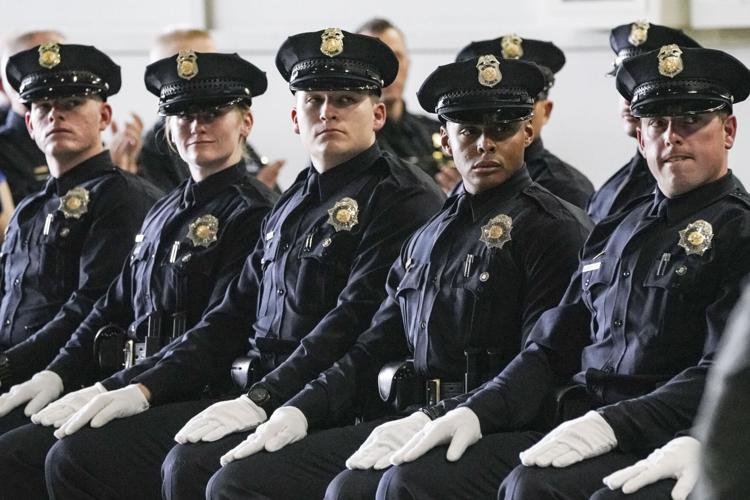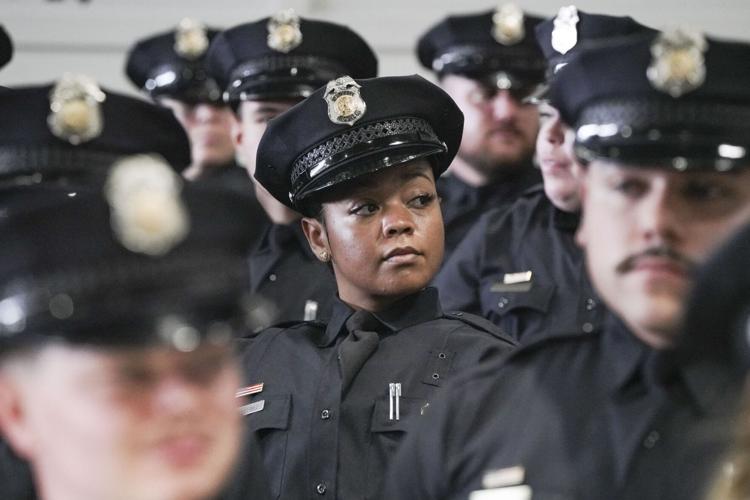Auditor: Denver Police Department staffing woes will remain without better strategies

FILE PHOTO: Denver Police Academy class 23-1 sits listening during the ceremony at the Denver Police Training Academy on Friday, Dec. 1, 2023 in Denver, Colo. 47 recruit officers were sworn in as Denver Police officers during the ceremony. (Rebecca Slezak/ Special to The Denver Gazette)
Rebecca Slezak/Special to The Denver Gazette
Finding and keeping Denver Police Department officers is likely to remain a challenge, according to a recent follow-up report from Denver Auditor Timothy O’Brien.
In June 2023, auditors found the department lacked documentation and guidance on how to address low retention and improve recruitment, as well as formal processes to track and monitor officer’s time worked.
A follow-up report released Jan. 2 shows that of the 16 original recommendations made by auditors, DPD had fully implemented only five, partially implemented four others and it “has not taken steps to address the risks seven other recommendations had sought to resolve.”
At the time of the original audit, DPD agreed to implement all 16 recommendations.
“Understaffing puts a strain on police agencies, reducing officers’ availability to respond to 911 calls and impairing their well-being,” auditors noted. “It also limits the time officers can spend in the community rebuilding trust and relationships with the people they serve.”
The original audit said DPD only had 1,364 active officers in 2022 — 7% short of its approved budget.
The department also lost more officers than usual. The agency typically loses about 70-to-80 officers per year.
In 2021, that number was 145.
However, DPD officials said the department is making progress.
Along with improving the training academy experience, DPD has also contracted with a strength training and conditioning company to help reduce the number of officer injuries, Sgt. Jay Casillas said in a department statement to The Denver Gazette.
“We were recently awarded new funding to revamp our exit interview process to take a deeper dive on why officers are leaving and implement necessary improvements,” he said. “The award will be available April 1 and is in the city contract process.”
Despite paying some of the highest salaries for police officers in the country, metro Denver’s public safety agencies have seen a decline in applications according to previous Denver Gazette reporting.
Because DPD hires through the city’s civil service commission, the process can be lengthy, said Casillas.
“However, we have been working closely with the Civil Service Commission to streamline and simplify processes to reduce the time from application to hiring,” he said.
The department has also streamlined its training for officers applying to DPD who are already certified by Colorado Peace Officer Standards & Training (POST)
“This program helps to remove the hurdle for officers who don’t want to go through a full training academy again,” Casillas said.
DPD created the EmpowHer academy — a program aimed at recruiting women, and has received grant funding to further this goal.
To date, 46 women have already completed the program; of those, 12 are in the application process, and one is currently in the DPD academy.
“Progress has been made to keep officers in Denver,” O’Brien said. “It’s good to see the department move toward better diversity practices, but there’s more work to be done.”
While auditors noted that DPD has created a “Community Policing Engagement Plan,” they found that it didn’t meet most of the criteria set forth in the original audit and had not been effectively communicated to officers, staff, and stakeholders.
Auditors also suggested DPD conduct further surveys of Denver residents to gauge the perception of the department.
“Receiving public comments and then responding with a new program where officers are meeting face-to-face with the people they serve is significant for building trust,” O’Brien said. “It shows that Denver police listen to public feedback.”
Although auditors acknowledge DPD’s “notable progress, the efforts did not fully address all the risks associated with the original audit findings. Auditors may revisit those risk areas in future audits to ensure the city takes appropriate corrective action.”
Denver Gazette reporter Sage Kelley contributed to this story.





